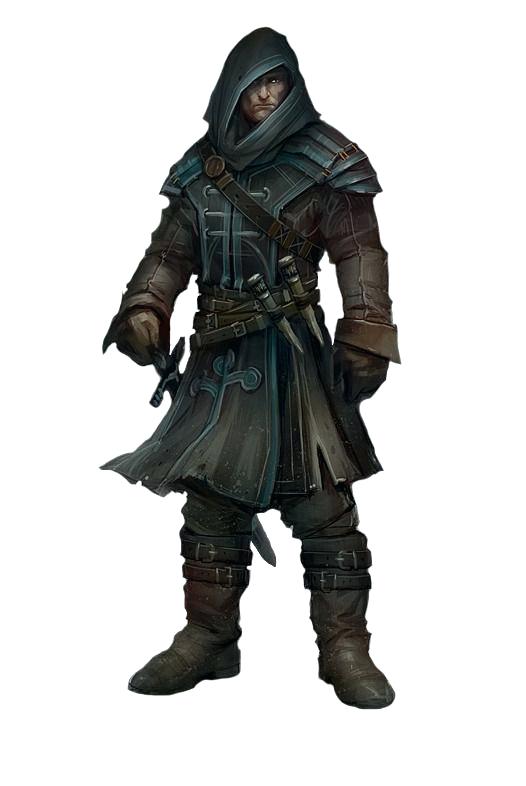
Instead of giving you a fully fleshed out character, I opted to take a different route this week and explore a multiclass build that would lend itself well to a particular character archetype, that of a religious inquisitor tasked with seeking out and destroying the enemies of your church from without and within.
Wood Elf Rogue (Inquisitive) 3/Cleric of Knowledge 1

Armor Class 13 (leather armor)
Hit Points 23
Proficiency Bonus +2
Speed 35 ft
Alignment lawful neutral
Languages Common, Dwarvish, Elvish, Giant, Gnomish, Halfling,
Ability Scores
Strength 8 (-1)
Dexterity 14 (+2)
Constitution 11 (+0)
Intelligence 14 (+2)
Wisdom 16 (+3)
Charisma 12 (+1)
Attacks
Melee Attack: shortsword +4 1d6+2 piercing damage, finesse, light
Melee or Ranged Attack: dagger +4 1d4+2 piercing damage, finesse, light, thrown (range 20/60)
Ranged Attack: shortbow +4 1d6+2 piercing damage, ammunition (range 80/320), two-handed
Skills Acrobatics +2, Animal Handling +3, Arcana +6, Athletics -1, Deception +3, History +6, Insight +8, Intimidation +3, Investigation +7, Medicine +3, Nature +2, Perception +5, Performance +1, Persuasion +3, Religion +4, Sleight of Hand +2, Stealth +2, Survival +3
Equipment shortsword, shortbow and quiver of 20 arrows, explorer’s pack, leather armor, two daggers, thieves’ tools, holy symbol, prayer book, 5 sticks of incense, vestments, set of common clothes, belt pouch containing 15 gp
Racial Features
Darkvision. Accustomed to twilit forests and the night sky, you have superior vision in dark and dim conditions. You can see in dim light within 60 feet of you as if it were bright light, and in darkness as if it were dim light. You can’t discern color in darkness, only shades of grey.
Keen Senses. You have proficiency in the Perception skill.
Fey Ancestry. You have advantage on saving throws against being charmed, and magic can’t put you to sleep.
Trance. Elves don’t need to sleep, instead, they meditate deeply, remaining semiconscious, for 4 hours a day. (The Common word for such meditation is “trance.”) While meditating, you can dream after a fashion; such dreams are actually mental exercises that have become reflexive through years of practice. After resting in this way, you gain the same benefit that a human does from 8 hours of sleep.
Elf Weapon Training. You have proficiency with the longsword, shortsword, shortbow, and longbow.
Fleet of Foot. Your base walking speed increases to 35 feet.
Mask of the Wild. You can attempt to hide even when you are only lightly obscured by foliage, heavy rain, falling snow, mist, and other natural phenomena.
Class Features
Expertise (Insight and Investigation). Your proficiency bonus is doubled for any ability check that uses either of these chosen proficiencies.
Sneak Attack (2d6). You know how to strike subtly and exploit a foe’s distraction. Once per turn, you can deal an extra 2d6 damage to one creature you hit with an attack if you have advantage on the attack roll. The attack must use a finesse or a ranged weapon. You don’t need advantage on the attack roll if another enemy of the target is within 5 feet of it, that enemy isn’t incapacitated, and you don’t have disadvantage on the attack roll.
Thieves’ Cant. During your rogue training you learned thieves’ cant, a secret mix of dialect, jargon, and code that allows you to hide messages in seemingly normal conversation. Only another creature that knows thieves’ cant understand such messages. It takes four times longer to convey such a message than it does to speak the same idea plainly. In addition, you understand a set of secret signs and symbols used to convey short, simple message, such as whether an area is dangerous or the territory of a thieves’ guild, whether loot is nearby, or whether the people in an area are easy marks or will provide a safe house for thieves on the run.
Cunning Action. Your quick thinking and agility allow you to move and act quickly. You can take a bonus action on each of your turns in combat. This action can only be used to take the Dash, Disengage, or Hide action.
Ear for Deceit. You develop a talent for picking out lies. Whenever you make a Wisdom (Insight) check to determine whether a creature is lying, treat a roll of 7 or lower on the d20 as an 8.
Eye for Detail. You can use a bonus action to make a Wisdom (Perception) check to spot a hidden creature or object or to make an Intelligence (Investigation) check to uncover or decipher clues.
Insightful Fighting. You gain the ability to decipher an opponent’s tactics and develop a counter to them. As a bonus action, you can make a Wisdom (Insight) check against a creature you can see that isn’t incapacitated, contested by the target’s Charisma (Deception) check. If you succeed, you can use your Sneak Attack against the target even if you don’t have advantage on the attack roll, but not if you have disadvantage on it. This benefit lasts for 1 minute or until you successfully use this feature against a different target.
Spellcasting. Your spell save DC is 13. Your spell attack bonus is +5.
Cantrips (at will) – mending, sacred flame, thaumaturgy
1st (2 slots) – bane, command, detect evil and good, detect magic, identify, guiding bolt
Blessings of Knowledge. You learn two languages of your choice. You also become proficienct in your choice of two of the following skills: Arcana, History, Nature, or Religion. Your proficiency bonus is doubled for any ability check you make that uses either of those skills.
Proficiencies
Armor Proficiencies: Light armor, medium armor, shields
Weapon Proficiencies: Simple weapons, hand crossbows, longsword, rapiers, shortsword, longbow
Tool Proficiencies: Thieves’ tools
Saving Throws: Dexterity, Intelligence
Skill Proficiencies: Arcana, Deception, History, Insight, Intimidation, Investigation, Perception, Persuasion, Religion
Background: Acolyte
Shelter of the Faithful. As an acolyte, you command the respect of those who share your faith, and you can perform the religious ceremonies of your deity. You and your adventuring companions can expect to receive free healing and care at a temple, shrine, or other established presence of your faith, though you must provide any material components needed for spells. Those who share your religion will support you (but only you) at a modest lifestyle.
Personality Traits: I see omens in every event and action. The gods try to speak to us, we just need to listen.
Ideals: Power. I hope to one day rise to the top of my faith’s religious hierarchy.
Bonds: I will do anything to protect the temple where I served.
Flaws: I am suspicious of strangers and expect the worst of them.
Design Notes: This character as written is a bit squishy for it’s role, and I would probably ditch the leather armor for a chain shirt and shield pretty quickly. They don’t have a lot of raw damage output, but with a +8 in Insight, they should be able to get their Insightful Fighting class feature against a majority of opponents granting them and extra 2d6 damage on each of their successful attacks, and that bonus will only increase as they add Rogue levels. Getting up to 6th level in Cleric gets you access to a few nifty spells such as suggestion, and the Read Minds Channel Divinity ability, but isn’t absolutely necessary, especially if you have designs on the 17th level Inquisitive ability Eye for Weakness to increase your sneak attack damage even further. However, their skill set makes them a veritable force of nature in exploration encounters, and to certain types of social encounters. This is where this archetype really shines in my own opinion.
